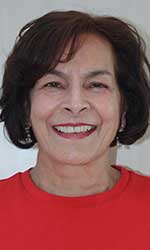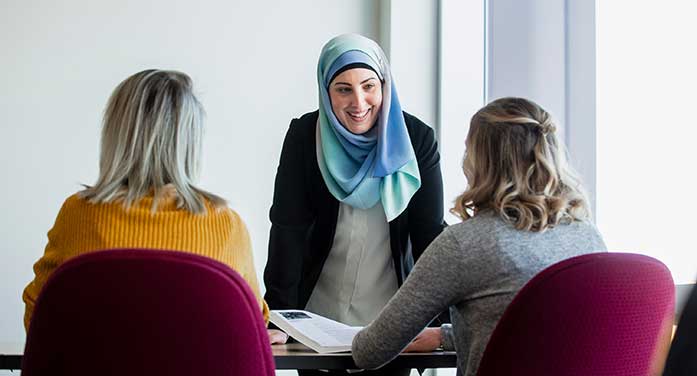For Jordana Salma, academic research should be a two-way street: an ongoing cycle of asking questions, identifying concerns and then working with communities to address them.

Mahenaz Layton
The assistant professor in the University of Alberta’s Faculty of Nursing relies on Alberta’s Muslim community to guide her studies of aging and health for seniors. In return, she promises to take concrete action based on what she learns to make life better for community members.
“I always imagine it as a balance between addressing community needs and at the same time advancing science,” said Salma, who is also a member of the Women and Children’s Health Research Institute. “They have to go hand in hand because of the real inequities that we see.”
“It’s not enough to explore what the issues are – we have to address them, and right away.”
Salma has set up the Muslim Seniors Research Committee, a group of 12 seniors in Edmonton who advise her on three research projects supported by grants from the Social Sciences and Humanities Research Council (SSHRC), one about digital literacy within Arabic-speaking communities and two on the impact of social isolation on seniors, particularly during COVID-19.
The group meets four times a year and is actively recruiting new members across Alberta. The goal is to ensure Salma’s research on healthy aging is community-driven and culturally sensitive.
Committee member Mahenaz Layton, 74, moved to Edmonton from England more than 40 years ago and now runs a seniors’ support group at Edmonton’s Rahma Mosque.
“We want to be contributing members of Edmonton,” said Layton, noting that Muslims have come here from Asia, Africa, Europe and elsewhere.
“The fabric of the community is enriched when we bring our different cultures to it.”
There is a historic lack of trust in authority figures, including academics, within some of the diverse Muslim communities, according to Salma.
“They want to know, ‘Why do you want my information, what are you going to do with it?’” she explained. “So, it’s key to show that once we collect information we’re also going back and doing things.”
Salma, who did her undergraduate nursing degree in Lebanon, began her U of A research as a graduate student, interviewing seniors about how they dealt with stroke and other chronic health concerns. She established a pilot exercise program in response. That demonstration of her commitment to implementing evidence-based solutions continues to open doors now that she is a professor.
“As an example, we were recruiting participants for a study, so the research assistants asked an imam at a mosque to help us advertise and we had 70 names within an hour after prayer,” Salma said. “That type of mobilizing in the community is really effective. It took a lot of time to build that trust.”
Salma deliberately hires Muslim university students to help with recruitment of study participants, translation, data collection and analysis.
“By familiarizing them with research methods, we are building capacity and sustainability within the community, so we can legitimize our voices and bring forward concerns to policy and decision makers,” Salma said.

Nursing professor Jordana Salma (centre) brought together a group of Muslim seniors to provide advice on her research into healthy aging — and in return, she promises to take concrete action based on what she learns. (Photo: Laughing Dog)
Thanks to Salma’s SSHRC funding, a community liaison person has been hired at Edmonton’s Al Rashid Mosque, working 12 hours per week to run a physical fitness program, share health information and make check-in phone calls with seniors during the COVID-19 pandemic.
“This is all driven by the community saying this is what we need in our surveys,” she said. “We will evaluate the impact as we move forward with our research.”
Salma and her team also support the program run by Layton, which offers a hot lunch and workshops on everything from incontinence to how to write a will. Layton is advocating for better home care services and long-term care facilities for Muslim seniors in Edmonton.
Both Salma and Layton say counteracting the recent spate of at least eight incidents of Islamophobic violence in Edmonton will take education and dialogue. To that end, the Muslim Seniors Research Committee contributed an opinion piece on Islamophobia for the Edmonton Journal, noting that two-thirds of such attacks go unreported because of shame or fear of backlash.
“Sadly these hateful crimes are often seen as an issue with the individual perpetrators rather than something that is structural or the result of broader narratives that legitimize the violence,” said Salma.
“We request that there be more systemic solutions to it, versus simply condemning individuals for their violent acts.”
Salma sees hope in a photo voice project she is leading to capture women’s pictures and stories about growing old in Canada.
“There’s a lot of resilience and strength in the stories they share,” she said of the 25 women who have been interviewed so far, noting most have agreed to be part of a public display.
“They want to disseminate these stories to counter the narrative of victimhood that seems to follow Muslim women everywhere.”
“We are creating awareness, building networks and gathering support every day, to make sure that the Muslim voices are heard,” said Layton.
| By Gillian Rutherford
Submitted by the University of Alberta’s Folio online magazine. The University of Alberta is a Troy Media Editorial Content Provider Partner.
© Troy Media
Troy Media is an editorial content provider to media outlets and its own hosted community news outlets across Canada.


